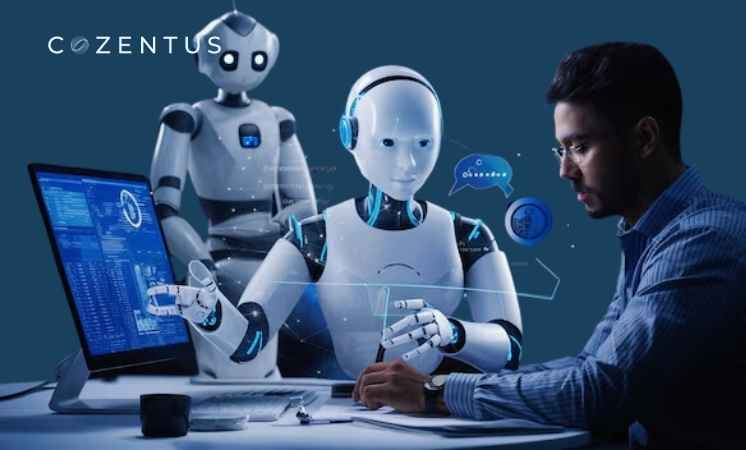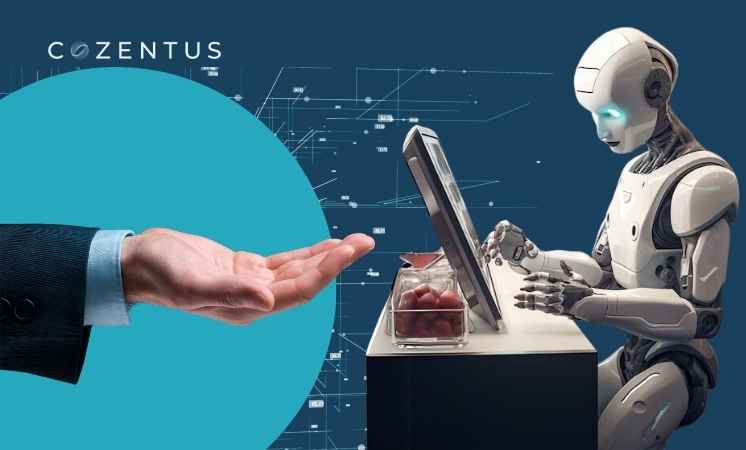
In the dynamic retail industry, where client demands are ever-changing, businesses must now personalize their goods and services. A new era of retail operations is being brought in by the groundbreaking potential of artificial intelligence, which is redefining how businesses communicate with their customers and making genuine personalization on a broad scale appear like a daunting task.
The retail industry is expected to witness substantial growth in artificial intelligence (AI), with a projected valuation of $9.36 billion in 2024 and $38.92 billion by 2029.
AI is transforming our understanding of client experiences, as well as the possibilities and resources it offers for creating distinctive personalization tactics. This blog will explore how the retail industry can leverage AI for personalized customer experiences and the benefits of such initiatives, with insights into how it can help businesses navigate this transformation.
Importance of Personalization in Retail
Presenting content, suggestions, and interactions that are specific to each customer's interests is what is meant by personalized customer experiences. Retail personalization has the potential to greatly raise conversion rates, foster client loyalty, and promote customer engagement. According to research, 80% of consumers are more inclined to make a purchase from a company that offers personalized experiences, and making customized recommendations can increase sales by up to 20%.
Business owners may utilize personalization as a powerful tool to differentiate their brand, retain customers, and increase revenue. Without the aid of modern technology, providing such experiences on a large scale is difficult, and here is where artificial intelligence (AI) comes into play.
Strategies for Enhancing Personalization Through AI
Artificial intelligence (AI) is transforming retail businesses, consumer interactions, operational management, and growth strategies. The following technologies enable this to happen:
Data Analytics
Initially, data is gathered from several sources like point-of-sale (POS) systems, AI-powered e-commerce sites, CRM systems, loyalty programs, and outside data sources. Next, in order to guarantee accuracy and consistency, raw data is cleaned, processed, and stabilized.
Machine Learning
Through the recognition of patterns and relationships, machine learning algorithms enable computers to learn from data and make predictions and evaluations on their own without the need for explicit programming.
Natural Language Processing
To extract meaning, sentiment, and ideas from text data, NLP algorithms process and evaluate the data. Sentiment algorithms are used in retail to analyze feedback from customers to find patterns, preferences, and areas for growth.
Computer Vision
Systems using computer vision are able to decode and assess visual data from pictures or videos. It includes segmentation, classification, and object identification in images. Computer vision is used in retail for several purposes, such as visual search, which allows shoppers to look up products using images.
The AI Revolution in Customer Experience

AI helps retailers in the gathering, investigation, and use of enormous volumes of consumer data to improve client profiles, forecast behavior, and make decisions instantly. The following are a few examples of how AI is changing tailored consumer experiences in retail:
1. Customer Data Analysis for Deep Insights
AI-powered solutions excel at handling huge amounts of consumer data from several offline and online touchpoints. To understand personal preferences and forecast future actions, machine learning algorithms in retail analyze demographic information, browser history, and past purchases. Retailers can develop personalized product suggestions and highly targeted marketing efforts by utilizing these insights.
2. AI-Powered Product Recommendations
Recommendation engines powered by AI are now a vital component of personalized shopping experiences. AI may make recommendations for products that match the interests of its users through studying consumer behavior and product preferences. This improves client happiness while creating more options for upselling and cross-selling. The AI-driven recommendation systems used by giant retailers like Amazon and Netflix are well-known and have set the standard for personalized services.
3. Chatbots and Virtual Assistants for Personalized Interactions
Chatbots and virtual assistants are AI tools that enable personalized, real-time customer interactions. These chatbots use natural language processing (NLP) to understand customer intent and provide relevant information, making customers feel valued and understood. The AI-driven retail strategy tools can answer customer queries, offer product suggestions, and guide users through the buying journey. By providing instant support, chatbots help reduce friction in the customer experience and improve satisfaction.
4. Dynamic Pricing Optimization
In real-time, AI algorithms are able to determine the best price for each product through analysis of competition pricing, industry trends, and consumer behavior. The implementation of personalized pricing strategies can result in increased customer loyalty and higher conversion rates by ensuring that each customer receives the appropriate offer at the correct time. Thus, businesses can improve customer happiness and raise the perceived value of their products by tailoring pricing to fit the needs of each particular customer segment.
5. Hyper-Personalized Marketing Campaigns
With the use of AI, retailers may develop highly customized marketing campaigns by categorizing audiences according to their unique desires, past purchases, and behavior. Retailers can send personalized SMS alerts, app notifications, or email promotions to each individual client. AI-driven marketing tools help retailers create tailored advertisements for a variety of media, increasing client interaction and boosting conversion rates.
6. Enhancing In-Store Experiences
Artificial Intelligence has the ability to improve in-store shopping experiences as well as online retail. Retailers may collect real-time customer data and provide personalized experiences, such as augmented reality (AR) fitting rooms, personalized product recommendations, and in-store navigation, by integrating AI with in-store technology.
Key Benefits of AI in Retail
- Increased customer engagement: AI-driven solutions personalize customer interactions across channels by analyzing data such as browsing behavior, purchase history, and preferences. Tools like AI chatbots and virtual assistants provide instant responses and recommendations, creating seamless shopping experiences that captivate customers.
- Higher conversion rates and sales: By personalizing product recommendations to individual interests, AI promotes upselling and cross-selling. Predictive analytics may also help optimize inventory by ensuring the right products are available at the right time, reducing stockouts, and increasing conversions.
- Improved customer retention and loyalty: AI improves consumer loyalty by establishing meaningful connections. Personalized loyalty programs and dynamic pricing strategies make customers feel appreciated, while AI-powered CRM systems send out timely follow-ups, offers, and reminders based on specific customer journeys.
- Efficient marketing spends: AI-powered marketing tools help retailers target the right audience with precision. By leveraging data analytics, AI optimizes ad placements, messaging, and timing, ensuring higher ROI on marketing campaigns. This reduces wasteful spending and improves campaign performance.
- Enhanced customer insights: AI extracts deep insights from both organized and unstructured data, such as social media sentiment, sales trends, and consumer feedback. Retailers may make more educated decisions about product offerings, pricing strategies, and shop layouts to better meet the demands of their customers.
Bottom Line

As technology advances, the future of retail lies in the smooth integration of AI technologies into the shopping experience. From tailored product recommendations to optimized logistics and improved customer service, AI is the engine powering a more efficient and consumer-focused retail business.
Organizations that adopt these technologies will not only be able to meet changing consumer demands, but they will also have a competitive advantage in a market that is becoming more and more digital. Unquestionably, artificial intelligence (AI) will have a profound impact on retail in the future, offering customers all over the world a more engaging, efficient, and personalized shopping experience.
We're not simply speculating anymore—we're forecasting trends, streamlining supply chains, and improving inventory management with the help of tailor-made AI-powered solutions. AI-powered solutions.
Are you interested to know how AI could benefit your retail business? Read here to know Read here to know how AI can take your supply chain business to new heights!
Recent Post
Subscribe to our newsletter
Stay updated on latest trends and news in the supply chain and logistics industry
Join our mailing list for monthly updates
Download Reports
AI-Powered Intelligent Document Processing -Your Launchpad to Digital Transformation
Download







